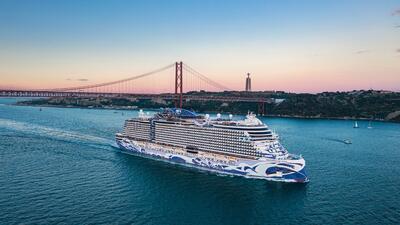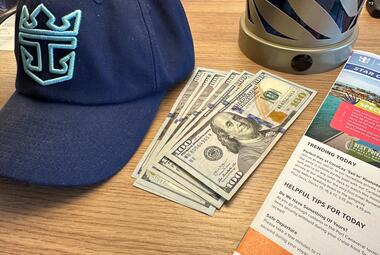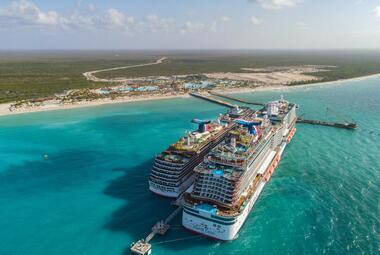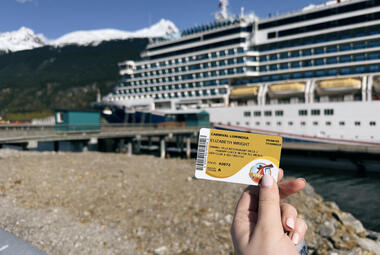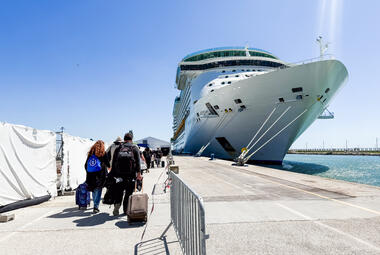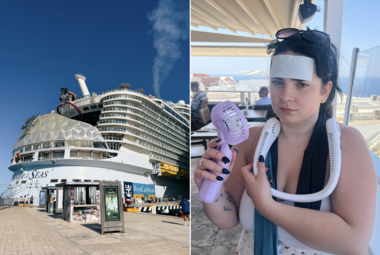One of the major appeals of cruising is that there's something for everyone, from mouthwatering cuisine that will satisfy the foodies to ultimate thrills that will keep the adrenaline of the most adventurous rushing.
Whether you're a seasoned cruiser or looking forward to your first sailing, there are cruise tips and hacks to make sure you're getting the most out of your vacation.
Below, we've narrowed down the top twenty tips for first-time cruisers to help make planning seem a little less overwhelming.
1. Research different cruise lines, ships, and itineraries

It's important to know what kind of vacation you're aiming for, so you can choose what cruise line, ship, and itinerary fits your needs.
Each of the seven different mainstream cruise lines offers guests a different experience. Carnival Cruise Line, for instance, prides itself on having the "most fun ships at sea," while Royal Caribbean is known for having the most innovative, thrilling ships at sea. Moreover, Virgin Voyages is the only adult-only mainstream line—ideal for those looking to let loose in a kid-free environment.
Even within each cruise line, the experience can vary from ship to ship. Are you looking for a mega ship with zip lines, go-karts, waterparks, and ropes courses? Or would you prefer a smaller ship with a more intimate feel?

Finally, how do you want to spend your days in port? If you want to spend most days lounging on the beach, maybe you'll enjoy the crystal clear waters of the Eastern Caribbean. Looking to zip line through a jungle, swim with stingrays, or venture off the beaten path on an ATV tour? The Western Caribbean would fulfill those wants.
If you don't dedicate the time to conducting research before booking your cruise, you might be left feeling disappointed.
2. Pick the right stateroom
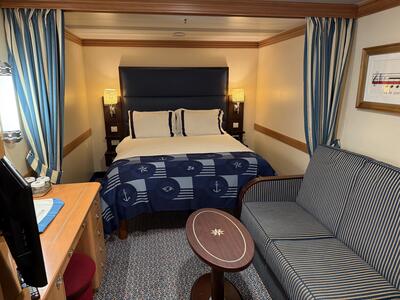
Once you've settled on the cruise line, ship, and itinerary that meets your vacation wants and needs, you'll have to decide on a cabin, which can range from a windowless interior cabin to a luxurious three-bedroom villa with a private butler.
What's your budget? Do you have a preference for the location of your cabin? Would you rather splurge on the accommodation or extra activities? Do you need a stateroom that will fit your large family?
Don't automatically choose the cheapest stateroom; it might not be the best fit for you and your travel party.
Read more: Top 25 cruise cabin hacks to improve your stateroom's functionality
3. Plan as much as you can in advance

Once you've picked the perfect cruise for you and your party, you'll gain access to the cruise line's online planner. Here, you can book dining reservations, shore excursions, onboard Wi-Fi, and other add-ons in advance.
Doing this ahead of time will ensure that once you board the ship, your vacation will be as hassle-free as possible.
Booking in advance will often save you money, too. Depending on the cruise line, you might receive 10% to 35% off the onboard prices of specialty restaurants, drink packages, shore excursions, and Wi-Fi.
4. Routinely check the price of your cruise
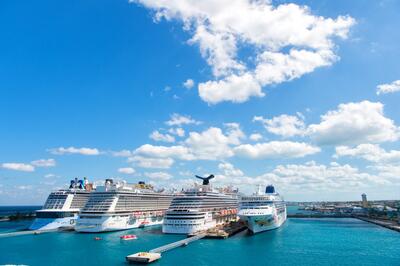
It is important to check the price of your cruise even after you've booked it because most cruise lines will adjust your rate to honor the lower pricing.
However, note that most will not adjust after final payment, so it's important to read up on your cruise line's specific policies. The final payment date can vary based on the itinerary, length of cruise, and cruise line.
5. Read over prohibited items
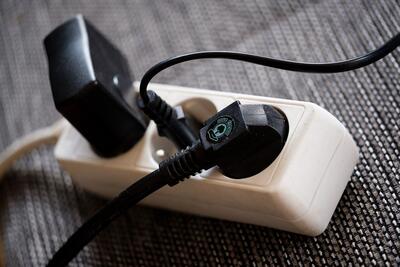
A few years ago, my friend went on her first cruise and left enough room in their luggage to pack a streamer for their dresses. Once they got onboard, however, they learned that it was confiscated due to it being a prohibited item.
Since staterooms, usually, have only so many outlets, many cruisers will try to bring power strips and surge protectors onboard, too. Unfortauntely, they're banned by many lines. Read your cruise line's list of prohibited items in advance to avoid packing items that will be confiscated until the end of the cruise.
Read more: 20 things cruise lines really do not want you to bring on ships
6. Learn ship lingo

Where's the aft of the ship? Which side is port and which is starboard? What's a muster drill? These are all concepts you should familiarize yourself with before your cruise.
Knowing that, for instance, starboard is the right side of the ship will help you locate your stateroom and other venues onboard.
7. Ship's time
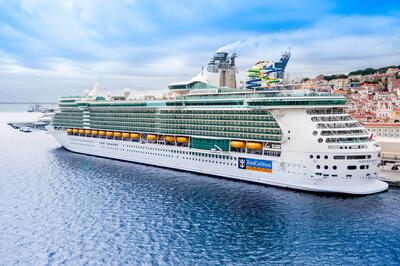
Ship's time is arguably the most important thing to familiarize yourself with before going ashore.
Throughout the voyage, you'll want to keep your watch set to the ship's time because if you've sailed into a different time zone, the local time will not necessarily match the ship's time.
If you're sailing from Florida to Mexico, for example, your phone might try to connect to the local time, which is one hour behind. You don't want to accidentally miss your ship's all-board time because of this!
8. Download the app ahead of time

Cruise line apps are a great source of information even before you board. They serve as a guide that will help answer many questions ahead of time.
You can access check-in and boarding information, deck plans, your itinerary, and even restaurant menus.
Once onboard, the app will allow you to make reservations for shows, track onboard spending, and, for an additional fee, chat with other guests.
Read more: The best cruise apps you need before your next sailing
9. Arrive to your departure city a day early
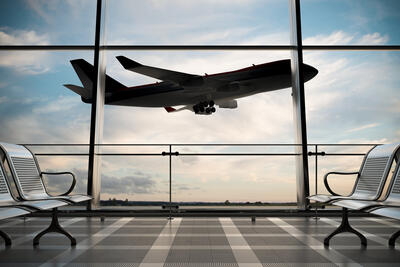
You should always plan to arrive at the port at least one day before the ship is scheduled to depart.
Even if you book a flight that arrives hours before the final call for embarkation, one flight delay could cause you to miss the ship; they won't wait for you.
Years ago, my family was scheduled to fly from North Carolina to Orlando on the morning of our Disney cruise. We ended up sleeping through our alarms and flat-out missing the flight. I remember the sheer panic of my parents as they loaded the car, shoved my sister and me inside, and took off driving. We barely arrived on time and learned our lesson! From then on, we always left the day before departure.
Read more: The costly cruising mistake newbies make planning their first cruise
10. Bring cash for the ports

While on the ship, you'll be able to charge everything to your onboard account. This, however, won't work when you disembark in ports of call.
Taxi drivers and local vendors selling souvenirs won't always accept credit cards, and depending on which credit card you have, you might even be charged a foreign transaction fee.
While cruise ships have ATMs, the fees can often be steep, so it is important to plan on bringing cash from home for incidentals. One way to get around paying the ATM fees is to go to the casino and load money into your account. The money will be charged to your onboard bill, and you can simply cash out and go to the cashier to get the money!
Read more: How much cash should you bring on a cruise?
11. Bring your own booze (or soda)
Most mainstream cruise lines will allow guests to bring a certain amount of wine, champagne, or beer onboard with them.
Royal Caribbean, for instance, allows guests 21+ to bring one bottle of 750ml wine or champagne per person onboard in their carry-on luggage. You can enjoy the beverages for free within your stateroom; however, a corkage fee of $15 will apply if consumed in public areas. They do not allow for beer or spirits to be brought onboard.
In addition to their alcohol policy, guests sailing on Royal Caribbean may bring 12 500ml cans, bottles, or cartons onboard. If you're hoping to save money or are unsure if your favorite beverage will be served, look into the policies of the specific line you are sailing with.
12. Pack all toiletries and medication you may need

Be sure you pack all of the toiletries and medication you may need.
If you forget something, you'll have to pay a premium for it onboard. It's also important to note that cruise ships don't have full pharmacies or convenience stores onboard, so your selections are limited.
I would recommend packing the following:
- Pain killers (Ibuprofen, Motrin, Tylenol, etc.)
- Band-aids
- Antibiotic ointment (Neosporin)
- Hydrocortisone (especially if you are going to ports where you'll be spending time outdoors and could get bug bites)
- Feminine hygiene products
- Dramamine
- Cold/flu medication (DayQuil/NyQuil, Tylenol Cold + Flu Severe, etc.)
- Cough drops (Ricola, Cepacol, etc)
- Toothbrush
- Toothpaste
- Deodorant
- Shaving cream
- Razors
- And, of course, lots of sunscreen!
Read more: How to make your own DIY cruise first aid kit
13. Bring a carry-on bag

Guests are encouraged to bring a carry-on bag with them when they embark on the ship.
Be sure to pack important items you'll want to access throughout the day before your luggage is delivered to your stateroom, such as sunscreen, sunglasses, bathing suits, medication (especially for motion sickness), jewelry, and electronics.
This way, you'll be able to start enjoying the ship without waiting for your suitcase.
14. Skip the buffet on embarkation day
One of the major appeals of cruising is the all-inclusive food. Who doesn't love to be able to eat whatever they want, whenever they want without racking up a bill?
That being said, skip the buffet on embarkation day. Don't worry—you'll have plenty of opportunities to try it throughout your sailing if you choose. Other relaxed venues serve lunch, so you can spend less time fighting crowds and waiting in line.
On last-minute cruise aboard Allure of the Seas in Nov. 2024, my dad and I skipped the Windjammer and went straight to Park Café for lunch. We easily found a place to sit and relax. In fact, we avoided the Windjammer that entire cruise.
15. Don't rely on the buffet for breakfast, either

Personally, I’m not a fan of buffets. They’re crowded, and people can be rude when reaching for food. That being said, don’t limit yourself to the buffet every morning for breakfast. One of the great things about cruises is that they have multiple complimentary dining options.
Try the Main Dining Room because the food will be fresher since it is made to order, or if you're in a rush, most cruise ships offer another fast-casual restaurant that'll satisfy the morning foodies. Carnival offers a sea day brunch for those who want to sleep in a little bit longer and don't want to go to the buffet!
Read more: Why you should eat dinner in the buffet
16. Be aware when gratuity is automatic

Most mainstream cruise lines will automatically add daily gratuities to your onboard account if you don't prepay them in advance. The daily rate varies based on the line and stateroom category, but you can expect to pay around $14-$25 per day.
In addition, cruise lines will add an automatic service charge to beverage purchases, specialty restaurants, and spa services. Holland America Line, for instance, charges a nonrefundable 18% service charge to "optional" purchases.
You don't need to double tip for these purchases, unless you feel the service warrants it!
Read more: Tipping on a cruise ship: Guide and what to do
17. Skip the elevator

With a couple thousand people moving throughout the ship, the elevators can get crowded, especially during meals and port days.
Even if you're able to squeeze on, the elevator will likely make multiple stops; it is not going to take you straight to your destination. That being said, sometimes, it's faster to take the stairs. If you insist on taking an elevator, know that it's common courtesy to let people off before trying to cram yourself in.
Plus, who doesn't love the opportunity to burn off a few extra vacation calories?
Read more: The unwritten rules of going on a cruise
18. Claim seats for shows at least 30 minutes early

Entertainment is one of the greatest appeals of cruising. From Broadway-style musicals to comedy shows that leave you in tears, there's truly something that'll make everyone happy.
Seating for shows is first come, first serve, so you'll want to arrive early to get a good seat.
And while there are bartenders who will serve you at your seat before the show begins, it is often quicker if you get a drink from an outside venue and bring it with you.
19. Be flexible, especially during hurricane season

Sometimes, captains will have to make the hard decision to change, or even skip, ports of call due to unforeseen circumstances, such as weather conditions that make tendering to shore unsafe.
While this is true year-round, it occurs most during hurricane season at ports. To avoid the storm, ships will sail around it. This, for instance, could mean your Western Caribbean itinerary becomes a Bahamas itinerary.
If this happens, try and make the most out of the situation. Another day at sea could mean you have the opportunity to spend the afternoon doing things you didn't think you'd have time for, or a different port of call could allow you to try a new excursion!
20. Pack a light jacket or sweater
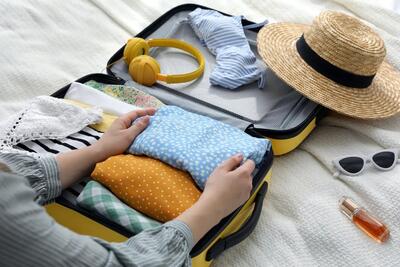
This might be common knowledge if you’re sailing to Northern Europe or Alaska, but you should plan on bringing one no matter the itinerary!
At night, the top decks can get windy and chilly. A lot of cruise lines will have events on the top decks, too, like movie nights or dance parties.
I’ve also experienced evenings where the air conditioning was blasting in public areas. There’s nothing worse than being cold while trying to enjoy dinner after a long day at port.
21. Bring your own shampoo
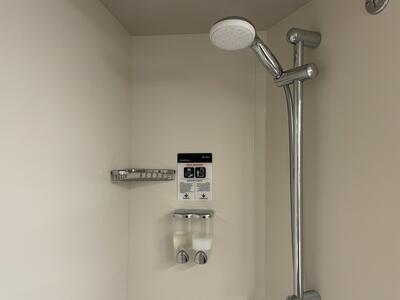
While you will get complimentary shampoo and soap in your stateroom, you really should bring your own.
The stuff you'll find in your bathroom is fine, but it's far from the best out there. If washing your hair is more than a rinse and you are particular about the brand of shampoo you use, definitely bring your own.
It's easy to overlook bringing shampoo because it's not something you might think about while packing for a cruise.
22. Put your phone into airplane mode
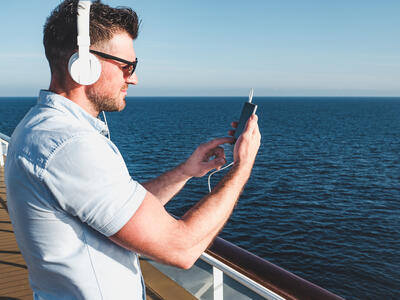
Something else you've likely never thought about are international roaming charges on your phone.
Once your ship leaves port, you're out of regular cell coverage and you can rack up giant bills if you don't remember to put your phone into airplane mode. Cruise ships have a cell antenna, but they're not included in any cell plan. This means it's considered roaming, and they charge your carrier big bucks to use.
When you get onboard, put your phone into airplane mode to disable its antenna. Don't worry, you can still connect to Wi-Fi (for an additional charge) while your phone is in airplane mode.
Read more: Do cell phones work on cruise ships?
23. Use a travel agent to book your cruise
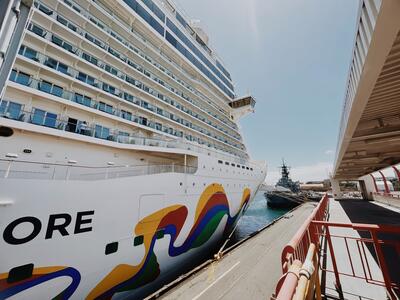
If you haven't booked a cruise yet, use a good travel agent as the perfect resource to book your cruise.
Travel agents provide a ton of value to someone booking a cruise because of their wealth of knowledge combined with how complicated booking a cruise is. In short, you don't know what you don't know about a cruise, and a travel agent can really save you time, money, and sanity.
From drawbacks of certain cabins to special rates available and various deposit rules you should know, a travel agent can make a big difference in booking your cruise.
Read more: What to look for in a travel agent for a cruise
24. Don't worry about carrying cash and credit cards around the ship with you

Either during the check-in process or once you're able to access your stateroom, you will be given a cruise card. While this card will serve as your room key, it's also like. credit card that you can use to charge all of your onboard purchases to.
Note that when you go ashore, you'll want to carry proper identification and credit cards. Your cruise card won't work at the local restaurant, and you definitely won't be able to purchase any souvenirs with it.
Read more: Where to keep your cruise card, phone, and cash during a shore excursion?
25. You can order multiple entrees in the main dining room

Food is an important aspect of any cruise vacation. Even if you aren't splurging on any specialty dining, you'll still have a great experience in the complimentary dining room.
If you're ever stuck on what to order, don't hesitate to order a second appetizer, entree, or dessert! Additionally, if there isn't any entree that sounds appealing, order a few appetizers and dessert instead! Your meal is truly customizable.
Note, however, that some cruise lines (i.e., Carnival) charge $5.00 for a third entree. There are also some options that come with an upcharge. These usually include prime cuts of steak and lobster.
26. Cruise insurance is always a good idea
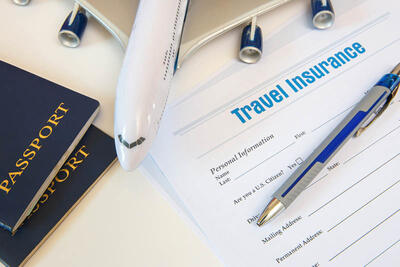
Nobody wants to think about the worst-case scenario for their upcoming trip. Unfortunately, it's not always smooth sailing once the deposit is placed.
Unexpected events, like the sudden onset of an illness prior or a canceled flight, can cause your time onboard to be thrown off course. When booking your cruise, it is important that you spend the extra money on travel insurance, as it will ensure that you'll be covered if things don't go as planned.
Read more: Cruise travel insurance and why you need it
27. Pack enough sunscreen
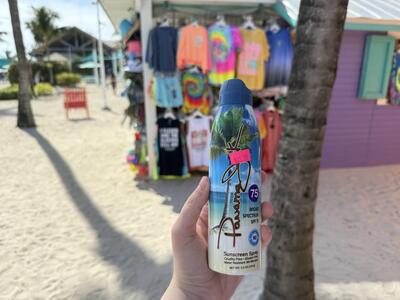
While this may seem like common sense, if you run out of sunscreen and have to buy more onboard, you'll likely be paying double what you would on land! I learned this lesson the hard way once when I was cruising on Symphony of the Seas in January 2023.
I had no choice but to buy a brand-new bottle while at Perfect Day at CocoCay. I knew that if I spent the entire day in the sun with no protection, I'd be in a great deal of pain later on. I ended up spending close to $17 for one bottle, whereas I can get one as cheap as $6.50 at my local Walmart.
During a recent visit in late 2024, I noticed the vendors were now charging $35 for a single bottle.
28. If you're driving and staying in a pre-cruise hotel, see if you can find one that offers parking

Parking at the cruise port is not cheap. On a 5-night sailing onboard Carnival Vista, my cousin and I ended up paying over $100!
If you don't live a short drive away and need to stay in a hotel the night before, consider booking one that will allow you to keep your vehicle on-site. This will save you money in the long run if you're planning on spending the night close to the port.
Alternatively, there are some third-party lots that offer cheaper parking options. It pays to do your research ahead of time, so you don't have to spend a lot of money just to keep your car safe.
Read more: Why you should plan a cruise within driving distance


